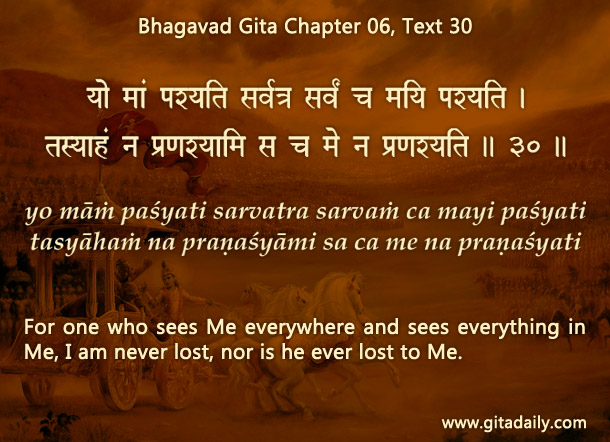Meditation is a process of both taking in as well as going in.
When we meditate on Krishna by chanting his holy names, we are, at one level, taking Krishna into our consciousness. We need to be as attentive and receptive as possible to ensure that he enters into our consciousness. At the same time, Krishna is not just yet another stimulus coming from some ordinary object, like the hundreds of other stimuli that enter into our consciousness. He is the supreme reality, the ultimate object who contains all other objects, the ultimate person who embodies all the love that all other people may have for us and who still has much more love for us.
Therefore, when we meditate on Krishna, we start appreciating how he is the biggest reality. And therefore we further appreciate that, rather than he entering into our consciousness, it is we who are entering into his presence. It is we who are meant to be praying for and longing for being ushered into his divine presence.
When we enter into Krishna’s magnificent and beneficent presence, we experience a security and satisfaction that is far greater than what might be experienced by just focusing our mind on any other point of concentration. While such concentration can be calming, the connection with Krishna and the entry into Krishna offer us immersion in a reality far bigger than ourselves.
Additionally, when it comes to Krishna, we understand that it is not just we who are concentrating on some point; it is we who are being drawn by the power of devotion from our side and, more importantly, by the power of mercy from Krishna’s side into a reality that is far greater and grander than us. Indeed, we are being drawn into the presence of a person whose intelligence and benevolence far exceed ours. It is at this stage that meditation on Krishna becomes enriching — extraordinarily, eternally, and ever-increasingly enriching.
These two dual aspects of devotional contemplation are pointed to in Bhagavad Gita (6.30), wherein it is said that the seers see Krishna in everything, by which they are able to focus on him among the myriad perceptions that comes into their consciousness. And the seers also see everything in Krishna, by which they understand that everything is a part of the divine — and they realize that they themselves are a beloved and precious part of the divine.
Once we attain this vision of dual connection with Krishna, the Bhagavad Gita assures that we will never be lost to him, nor will he ever be lost to us.
Summary:
- Meditation is not just about taking Krishna into our consciousness; it is also about ourselves entering into Krishna’s presence.
- Krishna is not just one object of concentration among many objects; he is the supreme object who contains all other objects.
- While focusing on Krishna can bring peace, immersing ourselves in him, recognizing him as a reality far greater and grander than ourselves, brings supreme enrichment and ecstasy.
Think it over:
- What are the dual aspects of meditation on Krishna?
- How is Krishna different from any other object of concentration?
- How is the experience of entering into Krishna far richer than the experience of focusing on Krishna?
06.30 For one who sees Me everywhere and sees everything in Me, I am never lost, nor is he ever lost to Me.


Leave A Comment